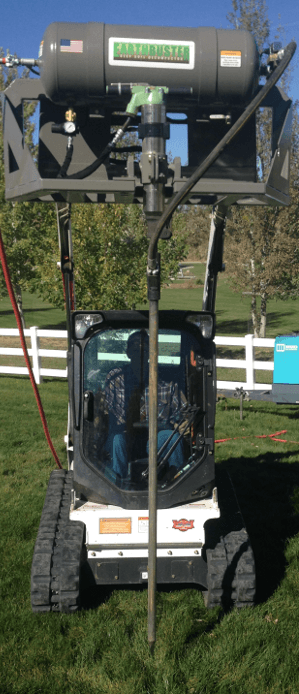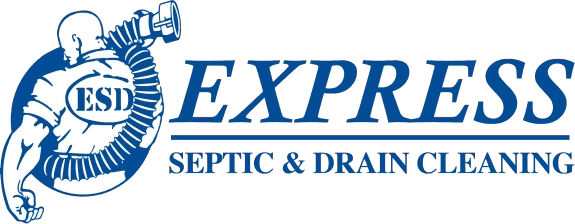A septic drain field, also known as a leach field, is an important part of septic systems. A drain field consists of a series of perforated pipes buried a few feet underground. These pipes work to dispose of and treat the liquid waste that flows out of the septic tank. In order to function properly, the soil that surrounds the drain field needs to be fairly loose. When too compacted, the water won’t drain completely.
In the past, the only way to repair septic issues caused by compacted soil in the drain field was to dig up the soil and install a new drain field. The EarthBuster Deep Soil Decompactor was developed to overcome this problem and can allow a compacted drain field to quickly be repaired without the need for any digging. To better understand this process, here is a full guide on how the EarthBuster system works, including why soil compaction can be such a major issue.
How Compacted Soil Affects a Septic Drain Field
The two main components of a septic system are the septic tank and the drain field. They work together to store and treat all of a building’s sewage and wastewater. Whenever you put water or solid waste down your drains or toilets, it flows through the main sewer line and into the septic tank. Once the waste enters the tank, the solids sink down toward the bottom. This is where the bacteria in the tank begin to decompose the solids and turn them into a thick sludge.
Every time new waste flows into the tank, some water can flow out into the drain field because of rising levels. The water then flows out through the holes in the drain field pipes. This is where it will be treated as it seeps through the surrounding soil.
Water constantly draining out into the ground every time you use your plumbing will result in the soil in the drain field settling and becoming more compacted over time. The soil can also become compacted if you drive over the leach field, especially after it has recently rained or snowed. This same issue is also why you should never place a shed or other heavy item over your leach field.
Most of the time, compacted soil will simply cause the water to drain more slowly. This means you could have issues with sewage backups whenever your plumbing gets a lot of use in a short amount of time. There are also times when the soil can become so compacted that it clogs the pipes, and no water will be able drain out of them.
As you continue to use your plumbing, the drain field pipes will eventually fill up to the point that no more wastewaters can drain out of the septic tank. This will eventually lead to the tank completely filling up and sewage starting to back up inside your drains. It could even overflow out of your toilets in some cases.
If the soil does become too compacted, sewage could back up in your house every single time you use your plumbing. As a result, your septic system will become unusable until you can fix the soil compaction issue.
How the EarthBuster System Can Fix a Compacted Drain Field
It can be costly and time-consuming to dig up and replace a drain field because the soil is too compacted. The EarthBuster system was invented just over a decade ago in order to allow septic contractors the ability to repair compacted drain fields without having to dig everything in the area up.
An EarthBuster system loosens soil through a process known as pneumatic soil fracturing. This process works by injecting a powerful jet of air deep into the ground to loosen and break up the soil. Water will then drain out and be absorbed into the ground much more quickly because of this aeration.
The EarthBuster is equipped with a large pneumatic air compressor that is connected to a 7-foot-long metal probe. A skid loader or tractor is used to raise the machine up in the air and then drive the probe down into the ground. Once in place, the compressor then blasts air into the ground to break up all of the surrounding soil.
The system is powerful enough that the air creates cracks or fissures in the soil for quite some distance. This allows it to break up the soil in the entire area without needing to actually place the probe within the drain field and risk damaging the pipes. In most cases, the probe is placed around 1 to 4 feet away from the field and is inserted every 2 to 5 feet all the way around the entire perimeter.
To achieve the best results, the probe also releases compressed air into the soil at various depths. This will break up the soil more thoroughly and allow for better drainage. It is always best to drive the probe about a foot or two below the bottom of the drain field. This will create upward fissures that will help the water to drain down more quickly. However, this is only sometimes possible depending on the composition of the ground and how high the water table is.
The entire process can usually be completed from start to finish in around four hours. This is a much shorter time frame than completely digging up a compacted drain field, which could consist of a few days of work.
How to Know When Soil Decompaction Is Necessary
If you’re having issues with sewage backing up in your home, a septic system inspection is necessary. This can happen because of compacted soil. It could also be that your sewer line is clogged or the inlet or outlet pipes in the tank are clogged. Another possibility is that the septic tank is full and needs to be pumped out.
If your drain field isn’t working because the soil is too compacted, you may start to notice a strong sewage odor whenever you are nearby. This can also happen when your tank is full and needs to be pumped, if the tank is damaged or it is leaking.
There are also a few issues that almost always indicate that you need to have your drain field decompacted. One thing to look out for is the ground above the field always feeling wet and soggy. Standing water is also a concern. Compacted soil can also lead to black sludge or ooze forming on the soil above or around the drain field.
If you do notice any of these issues, Express Septic & Drain Cleaning is here to help. We are the only septic company in Idaho to currently offer EarthBuster soil decompaction services. We can also provide assistance with septic repairs, pumping your septic tank, routine maintenance or a new installation. For more information on the EarthBuster system or septic service in the Boise, Nampa or Caldwell areas, contact Express Septic & Drain Cleaning today.



